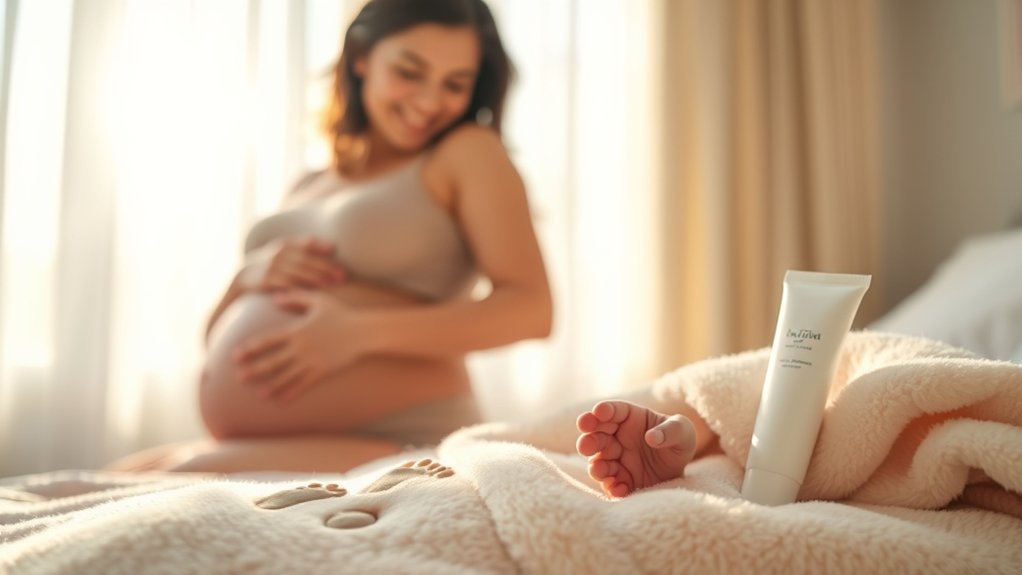As an expectant mother, you may find yourself concerned about baby acne, which often appears shortly after birth. Understanding this common skin condition is essential, especially since there’s no treatment during pregnancy. Instead, preparing for gentle care post-delivery is key. Knowing how to manage and prevent flare-ups can alleviate worries and help you focus on your new role as a parent. But what steps can you take to guarantee your baby’s skin remains healthy?
Understanding Baby Acne: What It Is and Why It Happens
Although baby acne can be concerning for new parents, it’s a common condition that typically resolves on its own. This skin issue usually appears within the first few weeks of life and is characterized by small red bumps or pustules on your baby’s face, particularly on the cheeks, nose, and forehead. The exact cause isn’t fully understood, but it’s believed to be related to maternal hormones that stimulate your baby’s oil glands, leading to clogged pores. Stress from birth may also play a role in its development. Rest assured, baby acne is harmless and doesn’t indicate an allergy or infection. While it can be distressing to see, most cases clear up within a few weeks to months without treatment.
Common Symptoms of Baby Acne
Baby acne often presents itself with a few distinctive symptoms that parents should be aware of. Recognizing these signs can help you differentiate it from other skin conditions. Here are the common symptoms you might notice:
- Small red or white bumps on the face
- Pustules or papules, primarily on cheeks and forehead
- Occasional flare-ups that might worsen with heat or crying
- No accompanying itching or discomfort for your baby
- Symptoms typically appear within the first few weeks after birth
Understanding these symptoms is essential for reassurance. While baby acne can be alarming, it’s generally harmless and resolves on its own. Keeping an eye on these signs will help you manage your baby’s skin health effectively.
Safe and Effective Treatment Options
When it comes to treating baby acne, parents often seek safe and effective methods to alleviate their child’s skin condition. Gentle cleansing is key; use a mild, fragrance-free soap and warm water to wash your baby’s face daily. Avoid scrubbing, as it can irritate the skin. You might also consider using non-comedogenic moisturizers to keep the skin hydrated. If you notice persistent acne, consult your pediatrician. They may recommend topical treatments formulated for infants, which can be effective and safe. Always refrain from using adult acne products, as these can be too harsh. Finally, patience is essential, as baby acne usually resolves on its own within a few weeks or months without aggressive treatment.
Preventing Baby Acne: Tips for New Parents
To help prevent baby acne, it’s essential to maintain a consistent skincare routine from the start. Here are some tips to keep in mind:
- Gently cleanse your baby’s face with mild soap and water daily.
- Avoid heavy creams or oils that can clog your baby’s pores.
- Keep your hands clean and avoid touching your baby’s face to reduce bacteria.
- Dress your baby in breathable fabrics to prevent overheating, which can exacerbate acne.
- Monitor skin products for allergens and irritants, opting for hypoallergenic options when possible.
When to Seek Medical Advice for Baby Acne
Wondering when it’s time to consult a healthcare professional about your baby’s acne? Most cases resolve on their own, but you should seek advice if the acne persists beyond six months, worsens, or is accompanied by other symptoms. Here’s a quick reference guide:
| Symptom | When to Seek Help | Possible Concerns |
|---|---|---|
| Persistent Acne | After 6 months | Could indicate underlying issues |
| Severe Redness | Immediately | Possible infection or allergy |
| Swelling | Immediately | Sign of infection |
| Pustules or Blisters | Immediately | May require treatment |
| Other Skin Changes | Anytime | Could signal different conditions |
Don’t hesitate to reach out if you’re concerned about your baby’s skin health.
Frequently Asked Questions
Can Baby Acne Affect Breastfeeding or Milk Supply?
No, baby acne doesn’t affect breastfeeding or milk supply. It’s a common skin condition that typically resolves on its own. Focus on breastfeeding techniques and maintaining a good latch for ideal milk flow.
Is Baby Acne Hereditary or Linked to Family History?
Just like branches of a family tree, baby acne can reflect hereditary traits. While it isn’t directly linked to family history, genetic factors may influence its occurrence, making it a possibility in some cases.
Are There Any Home Remedies for Baby Acne?
You can try gentle cleansing with mild soap, applying breast milk, or using a diluted chamomile tea compress. Always consult your pediatrician before starting any home remedies to guarantee they’re safe for your baby.
Can Baby Acne Cause Long-Term Skin Issues Later in Life?
No, baby acne typically doesn’t cause long-term skin issues. It’s a common, temporary condition that usually resolves on its own, so you shouldn’t worry about lasting effects on your baby’s skin health.
Does Baby Acne Differ From Other Skin Conditions Like Eczema?
Yes, baby acne differs from conditions like eczema. While baby acne appears as small red bumps, eczema presents as dry, itchy patches. Understanding these differences helps in identifying and managing your baby’s skin health effectively.
Conclusion
To sum up, while baby acne may feel like a mountain of concern for new parents, remember that it’s usually a temporary condition that resolves on its own. By preparing with gentle care and maintaining a clean environment for your little one, you can help ease your worries. If you notice persistent issues or signs of infection, don’t hesitate to seek medical advice. Your baby’s comfort and health are paramount, and with the right approach, you’ll navigate this phase with confidence.
